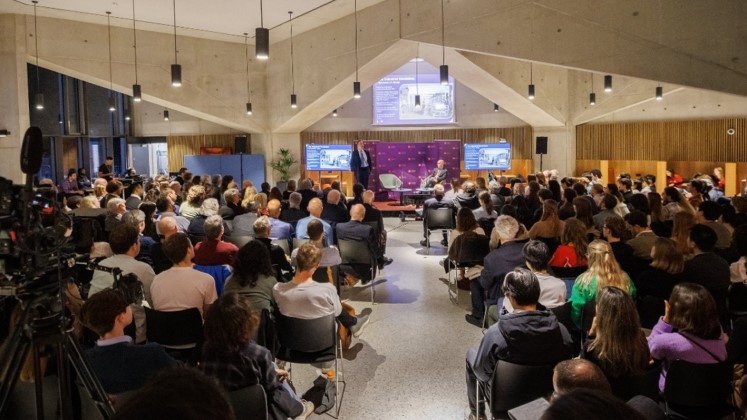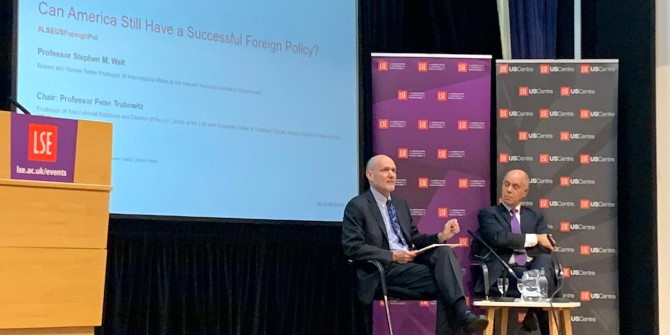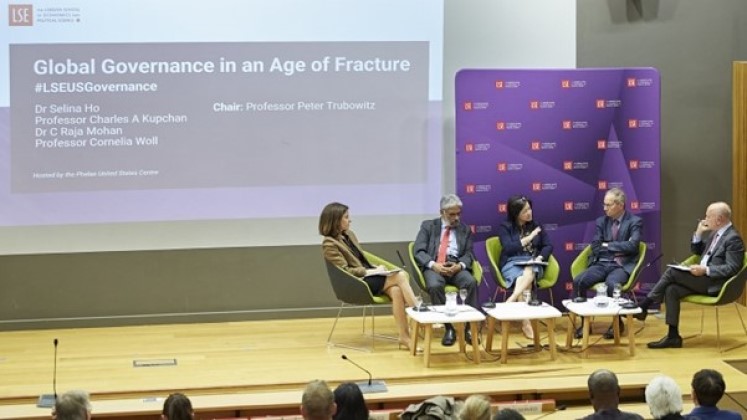 On Friday 20 and Saturday 21 October 2023, the Phelan US Centre hosted the conference, The Future of Capitalism in an Age of Insecurity, which brought together leading scholars and analysts to examine the effects of geopolitical turmoil, democratic discontent, anti-globalism, and technological change on capitalist economies. Jorich Loubser gives an overview of the conference and its panels.
On Friday 20 and Saturday 21 October 2023, the Phelan US Centre hosted the conference, The Future of Capitalism in an Age of Insecurity, which brought together leading scholars and analysts to examine the effects of geopolitical turmoil, democratic discontent, anti-globalism, and technological change on capitalist economies. Jorich Loubser gives an overview of the conference and its panels.
When so many of the foremost Americanist scholars come together it can be difficult to find a throughline in their contributions. However, it appears as if the participants at the LSE’s Phelan US Centre’s The Future of Capitalism in an Age of Insecurity Conference held on 20-21 October 2023 did share a certain set of beliefs. First, there are many forms of capitalism. Second, the contemporary form of capitalism is one of the worst possible forms of capitalism, particularly in the US. Third, it is still possible to shift towards a better form of capitalism, through a ‘reform capitalism’ project. Finally, these variations and possible variations of capitalism will manifest alongside and be informed by the re-emergence of ‘Great Power’ conflict, as the US and China contest hegemonic status.
Participants’ suggestions on how to get to a better future are interlinked to their understandings of how we got to where we are today. We need to understand the drivers of the form of contemporary capitalism if we are to succeed in the ‘reform capitalism’ project.
Crucially, from a domestic American perspective, the benefits arising from the last four decades of global production have been distributed unequally, extremely so. Thus, progress requires changes that would allow a much wider cross-section of society to benefit. What that change may look like is the site of contestation, especially in relation to the labor market.
During his keynote address on Friday 21 October, Professor Daron Acemoglu, Institute Professor at MIT, argued that many of the challenges in contemporary capitalism arise from a form of innovation that focusses on automation and cost-cutting, resulting in technological advances that often substitute human labor. In the US innovation has increased inequality as benefits derived from it are captured by elites, finance, and a number of large corporations, while large portions of the labor force, especially non-university graduates, are excluded.

However, through his historical analysis Professor Acemoglu illustrates that this does not have to be the case, as different forms of innovation will have different distributional effects. Thus, society needs to move innovation in a new direction, one that focuses on innovation that supplements and appends human labor and creates new tasks, not one that replaces it. This would require challenging elite figures’ decisions to direct innovation to different ends than are currently in place.
Another vision of the future addressed often throughout the conference was one that appears dominant within the Biden administration, best exemplified by US National Security advisor Jake Sullivan’s recent Brookings Institution speech. This vision argues that American policy should take a more protectionist turn alongside significant public investment, paired with “foreign policy for the middle class”. This vision sees “good jobs” being created in strategically important sectors such as the Green Transition space and semi-conductors – the British Labour Party, while less protectionist, also believe that working class communities can benefit tremendously from innovation and production linked to a green transition. While not fully independent economically, Sullivan argues that “we will unapologetically pursue our industrial strategy at home”.
While some speakers were clearly worried by an inward turn by many countries and increasing conflict between the US and China, there is a consensus that states must intervene in some form in their countries to ensure that good jobs are both protected and a whole new range are created. These jobs could be in traditional manufacturing sectors or, as Anne-Marie Slaughter argued during the first panel of the conference on 21 October, Globalisation and the return of geopolitics, in the care economy, creating jobs and addressing the challenges of aging populations. Clearly, there are a number of proposals for what a ‘reform capitalism’ project may look like.
However, many continue to frame this in win-win terms; in particular, that reforms will benefit business as well. If the form that contemporary capitalism has taken is one which has been driven by, in particular financial, capital, it is difficult to imagine that this reform project can achieve its goals without more openly challenging capital.
The reform project is crucial; however its success or failure remains dependent on political conflict between different interest groups. To date, capital has won this conflict. Can this be changed?
- Listen to and watch podcasts and videos from The Future of Capitalism in an Age of Insecurity Conference.
- Please read our comments policy before commenting.
- Note: This article gives the views of the author, and not the position of USAPP – American Politics and Policy, nor the London School of Economics.
- Shortened URL for this post: https://wp.me/p3I2YF-dE2





